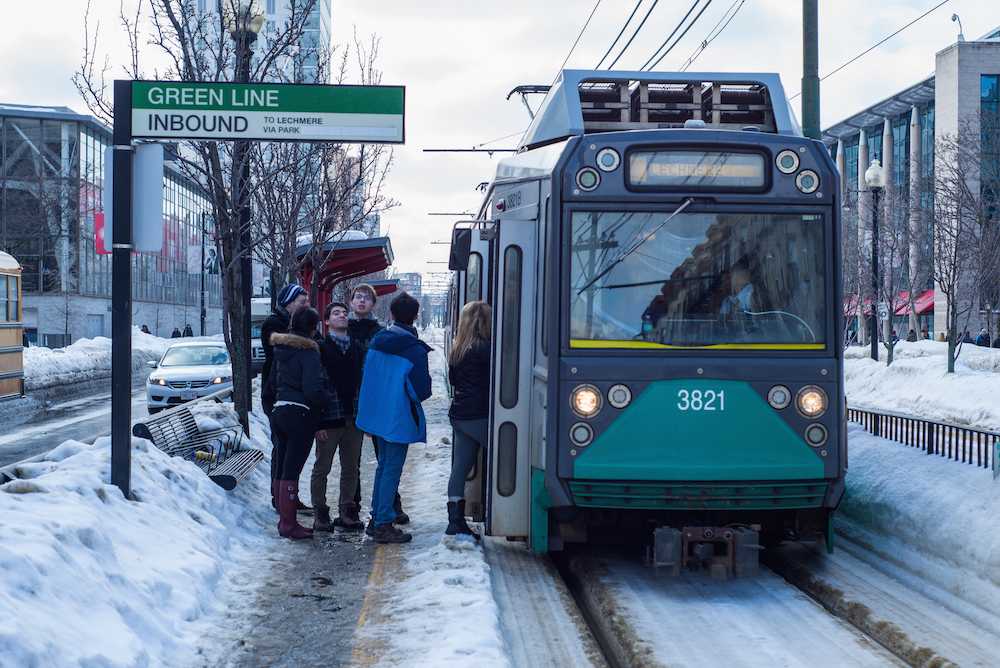By Oliver Price and Rowan Walrath, news staff
The MBTA Fiscal and Management Control Board (FMCB) decided unanimously to terminate the weekend late-night service on Monday, Feb. 29 due to a decline in ridership and cost inefficiency. The board will respond to complaints about the T’s cleanliness and timeliness.
The decision to end the late-night T is said to unfairly affect low-income and minority populations working late shifts. Consequently, the Federal Transit Administration has ordered the MBTA to carry out an equity analysis survey “to determine whether all options that would eliminate or mitigate disparate impacts have been implemented,” according to the Boston Globe.
“I think it’s unfair,” said Pau Costa, a freshman engineering student at Northeastern University.
However, Costa does not think this will impact college students significantly, if at all.
As defined by the MBTA in a presentation on the survey’s results, an equity analysis is a statistical comparison to find whether an adverse impact results from a proposed change based on minority. However, this survey will not affect the MBTA’s decision to go through with the cancelation of the night service.
“The FMCB has determined that no ‘equity analysis’ is required in connection with this determination, both because the survey is a pilot program and because the change does not constitute a major service change,” outlined in a copy of the presentation made available by the FMCB. “The FMCB has determined that the termination of the Late-Night Service Pilot Program will allow greater opportunities for the evening maintenance of the Authority’s vehicles and physical assets.”
According to the MBTA, the canceling of the late-night service will allow for their current services to be improved upon.
“The MBTA aims to design mitigation by limited cost and provide efficient service, provide with buses off peak to free rail for maintenance and allow [the] MBTA to measure impact of changes,” the presentation said.
While Costa believes that students may not be impacted, he thinks that workers will feel the change more than anyone.
“[The decision] unfairly affects workers. Anyone who uses the system to go to work is negatively affected,” Costa said.
Money saved from cutting late-night service can go toward projects, like planned Green Line extensions. On March 2, MBTA officials presented designs for new Green Line stations to a crowd in Somerville. However, dissenters say five of the seven planned stations could be scaled back, saving the transit authority around $300 million.
Amid all these changes, the end of the late-night service pilot program isn’t the only shift riders are lamenting. On July 1, MBTA fares will rise by an average of 9.3 percent, after the transit agency board unanimously approved increases on Monday, March 7.
According to the Boston Globe, the adult local bus fare will increase 10 cents, from $1.60 to $1.70. Adult rapid transit will rise 15 cents, from $2.10 to $2.25. The monthly LinkPass will increase $9.50, from $75 to $84.50, while the seven-day LinkPass will increase $2.25, from $19 to $21.25.
Many were angry with the fare hikes, including a group of protesters who made their voices heard at the March 7 meeting, and everyday commuters share their frustration.
“That’s messed up. They’re already ripping us off,” said Boston resident Leo Nardo.
In 2014, the MBTA increased prices between 5 and 7 percent. Before that, a 2012 hike raised fares by an average of about 23 percent systemwide, which prompted legislators to pass a 2013 law whose language was intended to cap fare hikes.
On Monday, March 7, the MBTA board also voted to expand its student pass program with a year-long pilot, making 12-month, $30 monthly passes available to more students.
Not everyone was mad about the fare hikes. In relation to other cities such as New York and Washington, D.C., fares are relatively cheaper.
“I’m totally fine with them. Do you ever see the fares in New York?” said Suzanne Maguire, a professor of chemical engineering at the Massachusetts Institute of Technology who commutes from Canton. “The problem is our system is so old. Instead of giving a whole new line to Somerville, [we should] put what needs to be invested into infrastructure.”
The MBTA will be able to celebrate soon. On March 21, five days before it was originally scheduled to open, Government Center will be revealed to the public. The station, which links the Blue and Green Lines, and has been closed since March 2014, will be open to public use after a ribbon-cutting ceremony scheduled to start at 11:45 a.m., MBTA spokesperson Joe Pesaturo told Boston.com.
The opening, however, comes after a mishap in which Reddit user foxy_on_a_longboard snuck past construction workers to take photos of the inside of the station. The photos are now available on photo sharing site Imgur.
Whether or not they’ll use Government Center station, Bostonians have mixed feelings about the MBTA. Helen Blackman, who commutes to Boston from Randolph, believes that the transit agency should be committed to helping its riders, not burdening them.
“The T’s problems shouldn’t have to be on the backs of the people,” Blackman said.
Photo by Scotty Schenck









